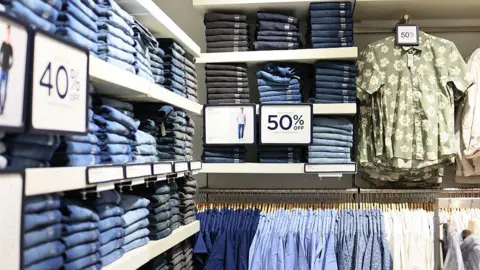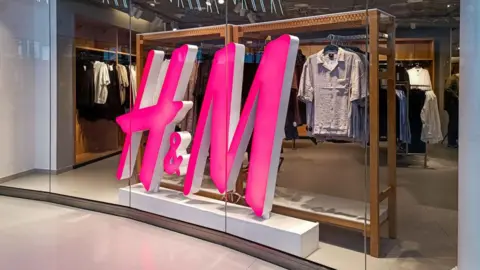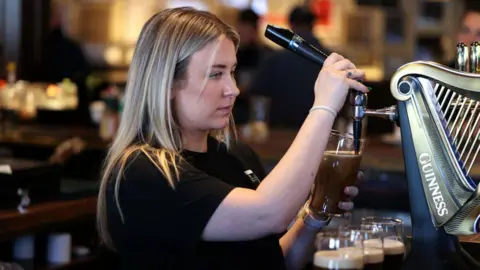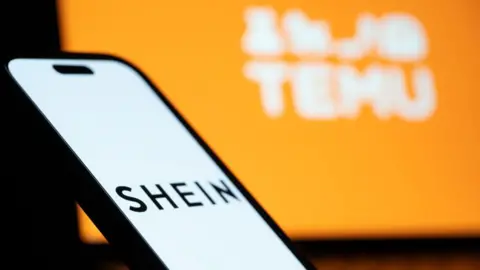Americans could pay more for these everyday basics under Trump's new tariffs
 Getty Images
Getty ImagesDonald Trump's plan to impose tariffs - or import taxes - for nearly every country in the world could push prices up on almost all the staples Americans routinely buy, from clothes to coffee.
After declaring a national economic emergency on Wednesday, the US president announced new tariffs on billions of dollars of goods of at least 10%. For countries he has deemed the "worst offenders", the rates can go as high as 50%. They start taking effect on 5 April.
Economists have warned the new levies - and those that other countries impose in retaliation - could push prices up for Americans across the board, and Federal Reserve Chairman Jerome Powell has said that they will increase inflation.
That's because the companies importing the goods may pass the costs of the tariffs on to customers or simply bring fewer products into the country, creating a limited supply.
Here are six everyday items that could become more expensive for American consumers.
Clothing – from Target to H&M to the Gap
The "worst offenders" about to be hit with the highest tariffs include the clothing manufacturing hubs of Vietnam, China and Bangladesh. The three - among the top five largest apparel importers to the US - could soon see levies ranging from 34% to 46% charged on their products.
That means major US department stores like Target and Walmart, where Americans often turn for affordable clothing, and some familiar apparel brands may feel the pressure.
The Gap, an American clothing retailer that also operates Old Navy, Banana Republic and Athleta, sources about 21% of its clothing from Vietnam, according to an analysis by Prof Sheng Lu at the University of Delaware's Fashion & Apparel Studies department. Another 37% of its clothing comes from India, Indonesia and Bangladesh.
H&M, known for its inexpensive fashions, manufactures most of its clothing in China and Bangladesh.
The tariffs could bring an "unfair burden to American families, particularly lower-income households", warned the US Fashion Industry Association in a statement on Wednesday.
Vietnam is open to working out a deal with the administration to avoid the tariffs, Trump has said. China, on the other hand, has retaliated with its own steep levies.
 Getty
GettyCoffee and other imported foods
Almost all of the coffee consumed in the US comes from outside the country, meaning it could soon become a bigger burden on Americans' wallets.
The US mostly sources its coffee from Brazil and Colombia, which are subject to the baseline 10% tariffs. Vietnam is also a key exporter of certain varieties.
Walter Haas, owner of San Francisco-based coffee roastery Graffeo, told the Washington Post that once tariffs hit, his company will feel it "immediately".
If they remain in place, those cost increases will be "permanently baked into the price consumers pay", he added.
Other imported foods could similarly rise in price, especially those coming from European Union nations, who will all be hit by a 20% tariff. Prices of shelf staples such as olive oil, which is primarily imported from Italy, Spain and Greece, could rise further.
- Live updates: Markets and reaction to Trump tariffs
- Full list: See all Trump tariffs by country
- Watch: Why Trump's tariffs aren't really reciprocal
- Chris Mason: Yet another example of colossal, upending change
- Reaction: Americans react to the president's trade policy
- Explainer: What are tariffs, and why is Trump using them?
Sneakers – including Adidas to Nike
Shoes and trainers, among the most basic necessities and also one of Americans' biggest splurges, could become more expensive, including the popular Nike Air Force 1 and Adidas Samba trainers. Both sportswear companies rely heavily on Asian factory hubs for their inventories.
About half of Nike and 39% of Adidas trainers are made in Vietnam.
In 2024, the US imported more than $27bn of footwear, mostly from China and Vietnam, which was subject to tariffs of about $3bn, according to data by Prof Lu.
Now, that tax amount could nearly triple.
UBS analysts told Reuters that, all in all, retailers may not be able to fully swallow the costs, and would need to raise prices by 10% to 12% to offset the levies on Vietnamese manufacturers.
Alcohol, including European wine and beer
France is one of the biggest foreign suppliers of wine to the US, and its winemakers have expressed anxiety about what the 20% EU tariffs will mean for their business.
The Bourgogne Wine Board, which represents producers in the French region of Burgundy, said the US tariffs would deliver "a serious blow" to both exporters and American consumers.
"The risk with these additional tariffs is that they could push our wines past a psychological price threshold," warned Laurent Delaunay, president of the Bourgogne Wine Board - meaning above what buyers feel comfortable paying.
Price increases could be seen at restaurants, especially for imported beers or drinks using foreign spirits. Separately, Trump expanded an aluminium tariff to include all canned beer, which could also make it more expensive for those who stay home.
UBS analysts told Reuters that large alcohol sellers would have to hike prices up to 5% to cover the tariffs if they choose not to absorb the costs themselves.
 Getty Images
Getty ImagesElectronics, like iPhones and video gaming consoles
Cell phones, TVs and video game consoles tend to be big-ticket purchases, and the latest US tariffs could make them even bigger.
China, as well as Taiwan and South Korea, are all top exporters of electronics to the US.
Almost all iPhones are made in China, although some are also made in India (which, too, is on the "worst offenders" list with a 26% tariff). Samsung, meanwhile, has significant production operations in Vietnam.
It's still unclear how these major tech companies will respond to the new levies. But Japanese video gaming company Nintendo announced on Friday that it is delaying pre-orders of its Switch 2 console, saying it needs to "assess the potential impact of tariffs."
Shein and Temu shopping hauls
 Getty Images
Getty ImagesAmericans may soon find that loading up fast-fashion hauls from Chinese online retailers like Temu or Shein with a few swipes on their phones has gotten more expensive.
Along with imposing the country-level tariffs, Trump has signed an executive order ending an exemption that prevented charging the levies on small-dollar shipments from China.
The exemption is referred to as the "de minimis" loophole, and it had allowed shipments under $800 (£620) to enter the US duty-free. Experts say it was a big reason why Temu and Shein were able to keep their costs low.
The order means those companies may have to pay taxes for the first time on the clothes they often send directly to customers.
It is unclear just how much costs for these goods could rise with the elimination of the loophole, but the White House says small shipments sent to the US through the international postal network could be subject to a tax of "either 30% of their value, or $25 per item."
That tax would then increase to $50 per item after 1 June, according to the White House.
